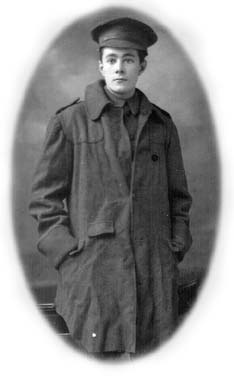
On leaving school, Henry Williamson joined the Sun Insurance Office as a clerk. The following spring, in May 1914, just before the First World War broke out, he went on a holiday to visit an aunt who rented a cottage in the little village of Georgeham on the north Devon coast. He immediately loved the area with its wild cliffs and moors and it made a great impression on him which was to have a lasting effect. He vowed to return. He had already enlisted into the ranks of the 5th Battalion, The London Rifle Brigade, City of London Regiment, Territorial Forces, in January 1914, and after the declaration of war was mobilised on 5 August. He was eighteen years and eight months old, and rather lost and frightened.
The Brigade marched out of London for training first at Bisley and then at Crowborough in Sussex. By November 1914 he was fighting in the trenches in Flanders as a private in the London Rifle Brigade, and was present at the famous Christmas Truce. His letters written to his mother at this time are a vivid and moving record of his life on active service. In January 1915 he was invalided home with dysentery and fever after a gas attack, but after further training, in April, aged 19, he was commissioned as a temporary second lieutenant in the Bedfordshire Regiment and was made full lieutenant with the Machine Gun Corps in November 1916. He returned to France as a transport officer in early 1917 but was later invalided home with severe sickness after a gas attack and was given first sick leave, and then a long convalescent leave. He was then kept on ‘home duties’ for the remainder of the war.
Awarded three general service medals, this wartime period was a crucial time of his life, with terrifying but thrilling battle scenes, male comradeship, wild and extravagant leaves and an escape fro m his overbearing father.
m his overbearing father.
The fraternisation on Christmas Eve 1914 – the astonishing Christmas Truce – made a deep and lasting impression upon his life, in which he saw that war was created by greed, misplaced zeal and bigotry. He could never forget that the German soldiers thought as deeply and sincerely as the English soldiers that they were fighting for God and Country. This determined his life’s work – to prevent war ever occurring again by showing the world, through his writing, that truth and peace lay in beauty and the open air.
He first wrote of his war experiences in The Wet Flanders Plain in 1929 (reminiscences after a return to the battlefields) followed by The Patriot's Progress in 1930, which is the story of John Bullock, an ‘everyman’ soldier, and considered a classic in the genre of war novels. But mainly he used his war experiences in his later long series of novels – How Dear is Life, A Fox Under My Cloak, The Golden Virgin, Love and the Loveless, and A Test to Destruction. (Vols. 4, 5, 6, 7, and 8 of A Chronicle of Ancient Sunlight) – which record the horror, terror and thrill of that terrible experience.
For further details and a timeline, see web page Henry Williamson and the First World War.
For those interested in this period of Henry Williamson's life, the following book is highly recommended:
 |
Anne Williamson, Henry Williamson and the First World War
A full account of Henry Williamson’s war service, including reproduction of all his letters home from the Front Line, his diaries, and his Army Notebooks, photographs and illustrations, giving a vividly immediate and detailed picture of life at the Front and in England at that time.
Sutton Publishing, 1998, p/b edn 2004 (now out of print)
|
